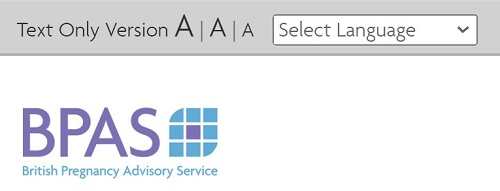Providing services that are accessible
BPAS is committed to supporting all people who need to access the services we provide. If you have an additional communication need please let a member of our team know either by telling the call advisor on our helpline when you call to book an appointment or a member of the team in a clinic.
Our website was designed in 2023 and has some functions to enable users with vision impairment to use assistive technology. All our videos on our website have closed captions and some have British Sign Language included. Our website uses Google Translate to translate into 100s of languages.
We provide textphone services for our booking and helplines.
In some of clinics we provide lifts, ramps and hearing loops.
We use translation services for clients where English is not their first language and British Sign Language translators.
More importantly for us is that we are able to provide care to you in a way that you can access but also that is right for you. Please let us know as early as you can during your care with us what we can do to support you further.
Known issues
Primary accessibility issues found include:
- missing structural landmarks and semantic markup;
- interacting with the navigation (mobile and desktop);
- images and infographics without alt text or alternative descriptions;
- no controls on carousels;
- contrast issues throughout including buttons and headings.
Following the accessibility audit we have fixed the following issues:
- Inconsistent functionality across different devices - the footer navigation is now visible on mobile devices
- Dual purpose top level navigation items - This method of dual click/hover functionality has been removed from the navigation on desktop and mobile devices.
- On key pages we converted images to text for prices and complication rate tables
- New images are loaded with descriptions
Contact us
If you are finding any content not accessible, please email marketing@bpas.org with your request.
We are always looking to improve the accessibility of our site, so if you find anything on the site difficult to use please let us know by emailing marketing@bpas.org.
If you have questions on enforcement procedure, please contact clientservices@bpas.org.
Text only version and font size
We now have a tool to convert our webpages to a text only version to improve accessibility. You can find the tool at the top left of each webpage. You can also select the font size for the original page and the text only version. You can find the font size options labelled 'A' next to the 'Text only version' button.

Clients may require BPAS to make reasonable adjustments to ensure they are well supported throughout their journey. This may include, but not limited to, clients with learning difficulties, Autism Spectrum Disorder (ASD), needle phobia, or sensory impairment.
Considering the needs of the client
We will ask the client what we can do to help support them to engage and make choices appropriate for them.
Examples include:
- Offer a face to face consultation, and allow a support person to attend with them.
- Discuss treatment options in the presence of a support person, or use pictures, video’s, diagrams to help explain their options. Use language that is appropriate and at a
- level they understand. Provide adequate time and space for the individual to process their options and weigh up the risks and benefits.
- Where possible, provide continuity of care. For example, can the person who admits the client also be present in theatre?
- Provide an opportunity for the client to visit the clinic prior to treatment so they can familiarise themselves with the building and theatre rooms. Take them on their “journey”, from checking in at reception to recovery and discharge, so they know what to expect on the day of treatment.
- Meet and greet – introduce the theatre staff prior to admission into theatre so the client is familiar with who will be present.
- Clear the theatre of any unnecessary equipment to ensure the client is not overwhelmed or triggered by any other equipment present.
- Allow the client to feel the speculum/gel/ultrasound probe etc before treatment or examinations.
- Ask the client if there is anything that helps them when they are scared or frightened? This could include allowing the client to listen to music in theatre, use numbing creams or sprays when taking blood or inserting cannulas, allowing the client to bring in a comforter (a blanket/teddy/ etc), or allow a support person to be present where possible.
- Talk to the client throughout treatment to provide reassurance.
Advice and support may be available via the Community Learning Disability Team in the client’s local area. Information for these services can be found on the NHS Choices website.
